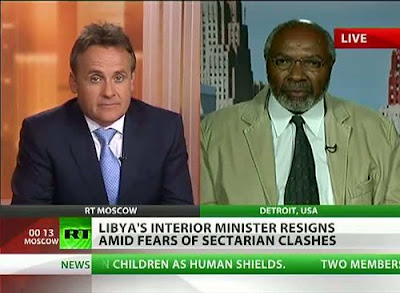The Ides of March 2011: NATO’s ‘Humanitarian’ War on Libya, Abayomi Azikiwe Interview on GRNH
With guests Abayomi Azikiwe and Mahdi Darius Nazemroaya
By Michael Welch, Abayomi Azikiwe, and Mahdi Darius Nazemroaya
Global Research, March 20, 2021
To listen to this program just click on this link: The Ides of March 2011: NATO’s ‘Humanitarian’ War on Libya - Global ResearchGlobal Research - Centre for Research on Globalization
“This is injustice, it is clear aggression, and it is uncalculated risk for its consequences on the Mediterranean and Europe…We are confronting Al Qaeda in the Islamic Maghreb, nothing more. What would you do if you found them controlling American cities with the power of weapons? Tell me how would you behave, so that I could follow your example?”
– Col Muammar Gaddafi, speaking to President Obama by letter in March 2011 [1]
A French plane, one of twenty in the Libyan region, attacked and destroyed its first target at 1645 GMT on March 19, 2011. [2]
These were soon joined by British fighter jets and US cruise missiles.[3]
Framed as enforcing a No-Fly zone authorized by the UN Security Council, the targets of these attacks were predominantly tanks and armoured vehicles, at least according to a spokesperson for the French Defense Ministry. Within days, these fighting forces merged under the command of NATO Allied Joint Force Command in Naples, along with the arms embargo against Libya under the name Operation Unified Protector.[4][5]
The coalition soon expanded to encompass nineteen other partners including Belgium, Bulgaria, Canada, Denmark, Greece, Italy, Jordan, the Netherlands, Norway, Qatar, Romania, Spain, Sweden, Turkey, and the United Arab Emirates. For seven months, according to Global Security, this crusade by these “Guardians of Humanitarianism” punched Libya with 26,500 sorties, including over 9,700 strike sorties. [6]
According to Julien Teil, film-maker of the documentary film “The Humanitarian War,” the military action on the part of NATO was launched in response to an initiative of the Benghazi based Libyan League for Human Rights and their head Soliman Bouchuiguir, accusing Colonel Muammar Gaddafi of human rights violations.
This initiative led to a petition signed by 70 Non-Governmental Organizations (NGOs) demanding the U.S., EU, and the UN to: “mobilize the United Nations and the international community and take immediate action to halt the mass atrocities now being perpetrated by the Libyan government against its own people.”
This is what set in motion a process of military intervention under the pretext of the “Responsibility to Protect.”[7]
Justifying War: From Yugoslavia to Syria
At the time Gadaffi was killed gruesomely by counter-revolutionaries, Libya had the highest GDP per capita on the continent, with fewer people below the poverty line than in the Netherlands.
Today, according to a study from the United Nations Office for Community Health Affairs, Libya is suffering a major humanitarian crisis. In a population with 7.4 million people, 1.3 million are in need of humanitarian assistance, with 700,000 of them needing food assistance.[8][9]
On the 10th anniversary of the launching of this war, the Global Research News Hour will attempt to decipher the REAL reasons for the invasion of Libya, taking a more detailed look at what has happened to it since, and what this could mean for the future of the country, and the African continent.
In our first half hour, we hear back from a long-time correspondent, Abayomi Azikiwe. He breaks down the true motives of the assault, the historical legacy of Muammar Gaddafi, and how the shattering of Libya will impact the broader African community.
In our second half, we have another long-timer joining us…Mahdi Darius Nazemroaya! The man was in Libya during the height of the war almost ten years ago. Following a replay of a former interview conducted by CKUW colleague Scott Price, we hear a more recent conversation in which he reflects on the humanitarian forces driving the war, the treatment of the Black African migrant situation, and of his cherished memories of the people he met there, and his positive outlook for the future.
Abayomi Azikiwe is the editor of Pan-African News Wire, and has appeared as a commentator on several media outlets. He is also a frequent contributor to Global Research.
Mahdi Darius Nazemroaya is an interdisciplinary sociologist and an award-winning author and geopolitical analyst, and author of The Globalization of NATO (Clarity Press) and a forthcoming book The War on Libya and the Re-Colonization of Africa. He is a Sociologist and Research Associate at the Centre for Research on Globalization (CRG), a contributor to the Strategic Culture Foundation (SCF) and a member of the Scientific Committee of Geopolitica, Italy.

No comments:
Post a Comment